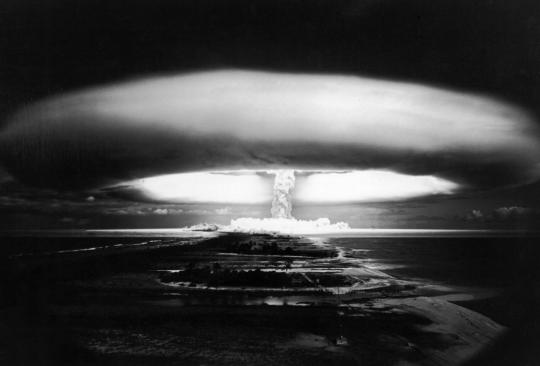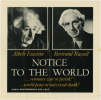Blog posts
Posts
A Hackers Manifesto, verze 4.0, kapitola 4.
By samotar, 10 January 2023
Alfred ve dvoře čili Poznámka k pražské hetero-utopii
By samotar, 10 November 2022
Trnovou korunou a tankem do srdíčka
By samotar, 2 July 2022
Hakim Bey - Informační válka
By samotar, 26 March 2022
Jean-Pierre Dupuy: Do we shape technologies, or do they shape us?
By samotar, 6 March 2022
Václav Cílek: Záhada zpívající houby
By samotar, 15 February 2022
Guy Debord - Teorie dérive
By samotar, 21 January 2022
Jack Burnham – Systémová estetika
By samotar, 19 November 2021
Poznámka pod čarou k výstavě Handa Gote: Věc, nástroj, čas, fetiš, hygiena, tabu
By samotar, 13 July 2021
Rána po ránech
By samotar, 23 May 2021
Na dohled od bronzového jezdce
By samotar, 4 March 2021
Z archivu:Mlha - ticho - temnota a bílé díry
By samotar, 7 October 2020
Zarchivu: Hůlna-kejdže
By samotar, 7 September 2020
Center for Land Use Interpretation
By samotar, 18 June 2020
Dawn Chorus Day - zvuky za svítání
By samotar, 30 April 2020
Z archivu: Bílé Břehy 2012 a Liběchov 2011
By , 3 April 2020
Z archivu: Krzysztof Wodiczko v DOXU
By samotar, 26 March 2020
GARY SNYDER: WRITERS AND THE WAR AGAINST NATURE
By samotar, 20 March 2020
Podoby domova: hnízda, nory, doupata, pavučiny, domestikace a ekologie
By samotar, 17 March 2020
Michel Serres: Transdisciplinarity as Relative Exteriority
By samotar, 5 November 2019
Pavel Ctibor: Sahat zakázáno
By samotar, 22 September 2019
Emmanuel Lévinas: HEIDEGGER, GAGARIN A MY
By samotar, 19 September 2019
Atmosférické poruchy / Atmospheric Disturbances - Ustí nad Labem
By samotar, 13 September 2019
Erkka Laininen: A Radical Vision of the Future School
By samotar, 10 August 2019
Anton Pannekoek: The Destruction of Nature (1909)
By samotar, 21 July 2019
Co padá shůry - světlo, pelyněk, oheň a šrot
By samotar, 30 December 2018
2000 slov v čase klimatických změn - manifest
By samotar, 2 November 2018
Vladimír Úlehla, sucho, geoinženýrství, endokrinologie, ekologie a Josef Charvát
By samotář, 22 September 2018
Lukáš Likavčan: Thermodynamics of Necrocracy - SUVs, entropy, and contingency management
By samotar, 20 July 2018
Tajemství spolupráce: Miloš Šejn
By samotar, 27 June 2018
Invisible Images (Your Pictures Are Looking at You) Trevor Paglen
By samotar, 2 June 2018
KŘEST KNIHY KRAJINA V POZORU: THE LANDSCAPE IN FOCUS.
By samotar, 18 May 2018
Případ zchudlé planety:Vojtěch Kotecký
By samotar, 22 April 2018
Rozhovor na Vltavě: Jak umění reaguje na dobu antropocénu?
By samotar, 10 March 2018
Skolt Sámi Path to Climate Change Resilience
By samotar, 10 December 2017
Brian Holmes: Driving the Golden Spike - The Aesthetics of Anthropocene Public Space
By samotar, 22 November 2017
Ohlédnutí/Revisited Soundworm Gathering
By samotař, 9 October 2017
Kleté krajiny
By samotar, 7 October 2017
Kinterova Jednotka a postnatura
By samotař, 15 September 2017
Ruiny-Černý trojúhelník a Koudelkův pohyb v saturnských kruzích
By samotar, 13 July 2017
Upsych316a Universal Psychiatric Church
By Samotar, 6 July 2017
Miloš Vojtěchovský: Krátká rozprava o místě z roku 1994
By milos, 31 May 2017
Za teorií poznání (radostný nekrolog), Bohuslav Blažek
By miloš vojtěchovský, 9 April 2017
On the Transmutation of Species
By miloš vojtěchovský, 27 March 2017
Gustav Metzger: Poznámky ke krizi v technologickém umění
By samotař, 2 March 2017
CYBERPOSITIVE, Sadie Plant a Nick Land
By samotař, 2 March 2017
Ivan Illich: Ticho jako obecní statek
By samotař, 18 February 2017
Dialog o primitivismu – Lawrence Jarach a John Zerzan
By samotar, 29 December 2016
Thomas Berry:Ekozoická éra
By samotař, 8 December 2016
Jason W. Moore: Name the System! Anthropocenes & the Capitalocene Alternative
By miloš vojtěchovský, 24 November 2016
Michel Serres: Revisiting The Natural Contract
By samotař, 11 November 2016
Best a Basta době uhelné
By samotař, 31 October 2016
Epifanie, krajina a poslední člověk/Epiphany, Landscape and Last Man
By Samotar, 20 October 2016
Doba kamenná - (Ein, Eisen, Wittgen, Frankenstein), doba plastová a temná mineralogie
By samotař, 4 October 2016
Hledání hlasu řeky Bíliny
By samotař, 23 September 2016
Harrisons: A MANIFESTO FOR THE 21ST CENTURY
By , 19 September 2016
T.J. Demos: Anthropocene, Capitalocene, Gynocene: The Many Names of Resistance
By , 11 September 2016
Bratrstvo
By samotař, 1 September 2016
Neptunismus a plutonismus na vyhaslé sopce Bořeň
By , 14 August 2016
Murray Bookchin: Toward an Ecological Society/ K ekologické společnosti (1974)
By samotař, 31 July 2016
Metafory, endofyzika, manželé Themersonovi a Gordon Pask
By samotař, 15 July 2016
Anima Mundi Revisited
By miloš vojtěchovský, 28 June 2016
Simon A. Levin: The Evolution of Ecology
By samotař, 21 June 2016
Anna Remešová: Je možné představit si změnu?
By samotar, 20 June 2016
Jan Hloušek: Uranové město
By samotař, 31 May 2016
Josef Šmajs: Složí lidstvo zkoušku své racionální dospělosti?
By samotař, 20 May 2016
Manifest The Dark Mountain Project
By Samotar, 3 May 2016
Pokus o popis jednoho zápasu
By samotar, 29 April 2016
Václav Cílek: Antropocén – velké zrychlení světa
By Slawomír Uher, 23 April 2016
Nothing worse or better can happen
By Ewa Jacobsson, 5 April 2016
Real Reason we Can’t Stop Global Warming: Saskia Sassen
By , 18 March 2016
The Political Economy of the Cultural Commons and the Nature of Sustainable Wealth
By samotar, 12 March 2016
Jared Diamond - Easter's End
By , 21 February 2016
Felix Guattari - Three Ecologies (part 1)
By , 19 February 2016
W. H. Auden: Journey to Iceland
By , 9 February 2016
Jussi Parikka: The Earth
By Slawomír Uher, 8 February 2016
Brian Holmes: Extradisciplinary Investigations. Towards a New Critique of Institutions
By Stanislaw, 7 February 2016
Co číhá za humny? neboli revoluce přítomnosti
By Miloš Vojtěchovský, 31 January 2016
Podivuhodný osud polárníka a malíře Julia Payera
By , 23 January 2016
Red Sky: The Eschatology of Trans
By Miloš Vojtěchovský, 19 January 2016
#AKCELERACIONISTICKÝ MANIFEST (14. května 2013)
By samotar, 7 January 2016
The Forgotten Space: Notes for a Film
By , 7 January 2016
Rise and Fall of the Herring Towns:Impacts of Climate and Human Teleconnections
By , 25 December 2015
Hlubinná, temná, světlá i povrchová ekologie světa
By , 22 December 2015
Three short movies: Baroque Duchcov, New Lakes of Mostecko and Lignite Clouds
By Michal Kindernay, 21 December 2015
Lenka Dolanová: Umění mediální ekologie
By , 21 December 2015
Towards an Anti-atlas of Borders
By , 20 December 2015
Pavel Mrkus - KINESIS, instalace Nejsvětější Salvátor
By Miloš Vojtěchovský, 6 December 2015
Tváře/Faces bez hranic/Sans Frontiers
By Miloš Vojtěchovský, 29 November 2015
Josef Šmajs: Ústava Země/A Constitution for the Earth
By Samotar, 28 November 2015
John Jordan: The Work of Art (and Activism) in the Age of the Anthropocene
By Samotar, 23 November 2015
Humoreska: kočky, koulení, hroby a špatná muška prince Josefa Saského
By Samotar, 13 November 2015
Rozhovor:Před věčným nic se katalogy nesčítají
By Samotar, 11 November 2015
Lecture by Dustin Breiting and Vít Bohal on Anthropocene
By Samotar, 8 November 2015
Antropocén a mocné žblunknutí/Anthropocene and the Mighty Plop
By Samotar, 2 November 2015
Rory Rowan:Extinction as Usual?Geo-Social Futures and Left Optimism
By Samotar, 27 October 2015
Pavel Klusák: Budoucnost smutné krajiny/The Future of a Sad Region
By ll, 19 October 2015
Na Zemi vzhůru nohama
By Alena Kotzmannová, 17 October 2015
Upside-down on Earth
By Alena Kotzmannová, 17 October 2015
Thomas Hylland Eriksen: What’s wrong with the Global North and the Global South?
By Samotar, 17 October 2015
Nýey and Borealis: Sonic Topologies by Nicolas Perret & Silvia Ploner
By Samotar, 12 October 2015
Images from Finnmark (Living Through the Landscape)
By Nicholas Norton, 12 October 2015
Bruno Latour: Love Your Monsters, Why We Must Care for Our Technologies As We Do Our Children
By John Dee, 11 October 2015
Temné objekty k obdivu: Edward Burtynsky, Mitch Epstein, Alex Maclean, Liam Young
By Samotar 10 October 2015, 10 October 2015
Czech Radio on Frontiers of Solitude
By Samotar, 10 October 2015
Beyond Time: orka, orka, orka, nečas, nečas, nečas
By Samotar, 10 October 2015
Langewiese and Newt or walking to Dlouhá louka
By Michal Kindernay, 7 October 2015
Notice in the Norwegian newspaper „Altaposten“
By Nicholas Norton, 5 October 2015
Interview with Ivar Smedstad
By Nicholas Norton, 5 October 2015
Iceland Expedition, Part 2
By Julia Martin, 4 October 2015
Closing at the Osek Monastery
By Michal Kindernay, 3 October 2015
Iceland Expedition, Part 1
By Julia Martin, 3 October 2015
Finnmarka a kopce / The Hills of Finnmark
By Vladimír Merta, 2 October 2015
Od kláštera Osek na Selesiovu výšinu, k Lomu, Libkovicům, Hrdlovce a zpět/From The Osek Cloister to Lom and back
By Samotar, 27 September 2015
Sápmelažžat Picnic and the Exploration of the Sami Lands and Culture
By Vladimir, 27 September 2015
Gardens of the Osek Monastery/Zahrady oseckého kláštera
By ll, 27 September 2015
Workshop with Radek Mikuláš/Dílna s Radkem Mikulášem
By Samotářka Dagmar, 26 September 2015
Czech Radio Interview Jan Klápště, Ivan Plicka and mayor of Horní Jiřetín Vladimír Buřt
By ll, 25 September 2015
Bořeň, zvuk a HNP/Bořeň, sound and Gross National Product
By Samotar, 25 September 2015
Já, Doly, Dolly a zemský ráj
By Samotar, 23 September 2015
Up to the Ore Mountains
By Michal, Dagmar a Helena Samotáři , 22 September 2015
Václav Cílek and the Sacred Landscape
By Samotář Michal, 22 September 2015
Picnic at the Ledvice waste pond
By Samotar, 19 September 2015
Above Jezeří Castle
By Samotar, 19 September 2015
Cancerous Land, part 3
By Tamás Sajó, 18 September 2015
Ledvice coal preparation plant
By Dominik Žižka, 18 September 2015
pod hladinou
By Dominik Žižka, 18 September 2015
Cancerous Land, part 2
By Tamás Sajó, 17 September 2015
Cancerous Land, part 1
By Tamás Sajó, 16 September 2015
Offroad trip
By Dominik Žižka, 16 September 2015
Ekologické limity a nutnost jejich prolomení
By Miloš Vojtěchovský, 16 September 2015
Lignite Clouds Sound Workshop: Days I and II
By Samotar, 15 September 2015
Recollection of Jezeří/Eisenberg Arboretum workshop
By Samotar, 14 September 2015
Walk from Mariánské Radčice
By Michal Kindernay, 12 September 2015
Mariánské Radčice and Libkovice
By Samotar, 11 September 2015
Tušimice II and The Vicarage, or the Parsonage at Mariánské Radčice
By Samotar, 10 September 2015
Most - Lake, Fish, algae bloom
By Samotar, 8 September 2015
Monday: Bílina open pit excursion
By Samotar, 7 September 2015
Duchcov II. - past and tomorrow
By Samotar, 6 September 2015
Duchcov II.
By Samotar, 6 September 2015
Arrival at Duchcov I.
By Samotar, 6 September 2015
Poznámka k havárii rypadla KU 300 (K severu 1)
By Samotar, 19 August 2015
"I am become Death, the Destroyer of Worlds" - The Russell-Einstein Manifesto and the Short Comment on Ecopatism
The term ecopathy is derived from two Greek words, oikos for “house” and pathy for “sickness”, “disease” or “suffering”. In a way it means a "sick house", a house which is not healthy, pleasant to live in. Or it is reffering to a wrong "house owner", a psychopath, somebody who is treating his or a commong house in dangerous way. In broader, social, or planetary scale it means a sick way of acting of certain species towards its environment. The word recognizes that the changing environmental condition of our planet is the direct result of our indifference and negligence in human behaviour that we seem not able of correcting, even though some people have known for long time, what to do and how to do it. The origin of the term "have emerged from the reflections of environmentally conscious Buddhist scholars in the West who would have been comparing the importance of compassion in their tradition to its relative absence in humanity’s treatment of nature".
The West was for centuries absorbed in a cage of Cartesian paradigm: there is a clear distinction between Us - the mankind, and It - the "world Outside", "Reality". Between res cogitans and res extensa, which is non-cogitans, not thinking. In the Cartesian view, the distinction between two concepts is a methodological necessity driven by "a distrust of the senses and the res extensa as it represents the entire material world". Edmund Husserl in 1931 offered in his Cartesian Meditations: An Introduction to Phenomenology a radically different concept of the Reality, though "one might almost call transcendental phenomenology a neo-Cartesianism, even though It Is obliged — and precisely by its radical development of Cartesian motifs — to reject nearly all the well-known doctrinal content of the Cartesian philosophy." In a way this mindset caused the development of Cybernetics and Cybernetics of Second Order, which brings the feeling of unity of two aspect of "reality" back: this what is observing and this what is observed. This was developed from an examination of the nature of "feedback" and the "Black Box"—both seen as "circular systems, where the circularity is taken seriously". (Paul Pangaro)
In the early 1930s, Albert Einstein asked Sigmund Freud how might be the approaching global war prevented? Freud wrote back in his letter that Thanatos “is at work in every living creature and is striving to bring it to ruin and to reduce life to its original condition of inanimate matter” and referred to it as a “death instinct.” According Freud, Thanatos was an innate biological process with significant mental and emotional consequences – a response to, and a way to relieve, unconscious psychological pressure.
Even Einstein seemingly believed in the gap between Mankind and Environment: “The environment is everything that isn't me.” This seems from today perspective a bit short minded. As if only the weltangst and the experience of the possibility of termination of human existence on the Planet could return us to the notion of feedback, the Ethernal Chain of Beings, to fix the tension between our minds and our bodies.
Robert Oppenheimer recalled that, while witnessing the explosion of the nuclear bomb in 1945, he thought of a verse from the Bhagavad Gita (XI,12):
If the radiance of a thousand suns were to burst at once into the sky, that would be like the splendor of the mighty one ..
Years later he would explain that another verse had also entered his head at that time: namely, the famous verse which he translated as:
"I am become Death, the destroyer of worlds."
In 1965, he was persuaded to quote again for a television broadcast: "We knew the world would not be the same. A few people laughed, a few people cried. Most people were silent. I remembered the line from the Hindu scripture, the Bhagavad Gita; Vishnu is trying to persuade the Prince that he should do his duty and, to impress him, takes on his multi-armed form and says, 'Now I am become Death, the destroyer of worlds.' I suppose we all thought that, one way or another."
Shortly before Einstein died in April 1955 he endorsed with Bertrand Russell a declaration calling for the renunciation of war because the invention he was involved in, the nuclear boms are threatening “the continued existence of mankind.” Lord Russell published the text of the declaration, signed also by six other scientists. On the same day he posted letters to Sir Anthony Eden, President Eisenhower, Marshal Bulganin, Chou En-lai, President Coty of France, and the Prime Minister of Canada St Laurent.
‘It is feared that if many H-bombs are used there will be universal death, sudden only for a minority, but for the majority a slow torture of disease and disintegration’, stated the 1955 Russell-Einstein Manifesto. The signatories, mostly physicists, spoke as ‘members of the species Man’, although Woman was excluded and no other species signed. They asked that the politics of communism and anti-communism be set aside, and that citizens of the world ‘…consider yourselves only as members of a biological species which has had a remarkable history, and whose disappearance none of us can desire.’
The Russell-Einstein Manifesto
In the tragic situation which confronts humanity, we feel that scientists should assemble in conference to appraise the perils that have arisen as a result of the development of weapons of mass destruction, and to discuss a resolution in the spirit of the appended draft.
We are speaking on this occasion, not as members of this or that nation, continent, or creed, but as human beings, members of the species Man, whose continued existence is in doubt. The world is full of conflicts; and, overshadowing all minor conflicts, the titanic struggle between Communism and anti-Communism.
Almost everybody who is politically conscious has strong feelings about one or more of these issues; but we want you, if you can, to set aside such feelings and consider yourselves only as members of a biological species which has had a remarkable history, and whose disappearance none of us can desire.
We shall try to say no single word which should appeal to one group rather than to another. All, equally, are in peril, and, if the peril is understood, there is hope that they may collectively avert it.
We have to learn to think in a new way. We have to learn to ask ourselves, not what steps can be taken to give military victory to whatever group we prefer, for there no longer are such steps; the question we have to ask ourselves is: what steps can be taken to prevent a military contest of which the issue must be disastrous to all parties?
The general public, and even many men in positions of authority, have not realized what would be involved in a war with nuclear bombs. The general public still thinks in terms of the obliteration of cities. It is understood that the new bombs are more powerful than the old, and that, while one A-bomb could obliterate Hiroshima, one H-bomb could obliterate the largest cities, such as London, New York, and Moscow.
No doubt in an H-bomb war great cities would be obliterated. But this is one of the minor disasters that would have to be faced. If everybody in London, New York, and Moscow were exterminated, the world might, in the course of a few centuries, recover from the blow. But we now know, especially since the Bikini test, that nuclear bombs can gradually spread destruction over a very much wider area than had been supposed.
It is stated on very good authority that a bomb can now be manufactured which will be 2,500 times as powerful as that which destroyed Hiroshima.
Such a bomb, if exploded near the ground or under water, sends radio-active particles into the upper air. They sink gradually and reach the surface of the earth in the form of a deadly dust or rain. It was this dust which infected the Japanese fishermen and their catch of fish.
No one knows how widely such lethal radio-active particles might be diffused, but the best authorities are unanimous in saying that a war with H-bombs might possibly put an end to the human race. It is feared that if many H-bombs are used there will be universal death, sudden only for a minority, but for the majority a slow torture of disease and disintegration.
Many warnings have been uttered by eminent men of science and by authorities in military strategy. None of them will say that the worst results are certain. What they do say is that these results are possible, and no one can be sure that they will not be realized. We have not yet found that the views of experts on this question depend in any degree upon their politics or prejudices. They depend only, so far as our researches have revealed, upon the extent of the particular expert’s knowledge. We have found that the men who know most are the most gloomy.
Here, then, is the problem which we present to you, stark and dreadful and inescapable: Shall we put an end to the human race; or shall mankind renounce war?1 People will not face this alternative because it is so difficult to abolish war.
The abolition of war will demand distasteful limitations of national sovereignty.2 But what perhaps impedes understanding of the situation more than anything else is that the term “mankind” feels vague and abstract. People scarcely realize in imagination that the danger is to themselves and their children and their grandchildren, and not only to a dimly apprehended humanity. They can scarcely bring themselves to grasp that they, individually, and those whom they love are in imminent danger of perishing agonizingly. And so they hope that perhaps war may be allowed to continue provided modern weapons are prohibited.
This hope is illusory. Whatever agreements not to use H-bombs had been reached in time of peace, they would no longer be considered binding in time of war, and both sides would set to work to manufacture H-bombs as soon as war broke out, for, if one side manufactured the bombs and the other did not, the side that manufactured them would inevitably be victorious.
Although an agreement to renounce nuclear weapons as part of a general reduction of armaments3 would not afford an ultimate solution, it would serve certain important purposes.First, any agreement between East and West is to the good in so far as it tends to diminish tension. Second, the abolition of thermo-nuclear weapons, if each side believed that the other had carried it out sincerely, would lessen the fear of a sudden attack in the style of Pearl Harbour, which at present keeps both sides in a state of nervous apprehension. We should, therefore, welcome such an agreement though only as a first step.
Most of us are not neutral in feeling, but, as human beings, we have to remember that, if the issues between East and West are to be decided in any manner that can give any possible satisfaction to anybody, whether Communist or anti-Communist, whether Asian or European or American, whether White or Black, then these issues must not be decided by war. We should wish this to be understood, both in the East and in the West.
There lies before us, if we choose, continual progress in happiness, knowledge, and wisdom. Shall we, instead, choose death, because we cannot forget our quarrels? We appeal as human beings to human beings: Remember your humanity, and forget the rest. If you can do so, the way lies open to a new Paradise; if you cannot, there lies before you the risk of universal death.Resolution:
We invite this Congress, and through it the scientists of the world and the general public, to subscribe to the following resolution:
“In view of the fact that in any future world war nuclear weapons will certainly be employed, and that such weapons threaten the continued existence of mankind, we urge the governments of the world to realize, and to acknowledge publicly, that their purpose cannot be furthered by a world war, and we urge them, consequently, to find peaceful means for the settlement of all matters of dispute between them.”
Signatories:
Max Born
Percy W. Bridgman
Albert Einstein
Leopold Infeld
Frederic Joliot-Curie
Herman J. Muller
Linus Pauling
Cecil F. Powell
Joseph Rotblat
Bertrand Russell
Hideki YukawaIssued in London, 9 July 1955
The Russell–Einstein Manifesto became the Pugwash Conferences' founding charter. The first of the conferences was held in July 1957 in London.
In his recent published book, associate professor in the College of Arts and Sciences at the University of South Florida Daniel Belgrad, tells the story of a clash where conservative forces actively undermined the potential of ecological thinking. Attempts at reaching beyond of neoliberalism, of the society of "the Self" were replaced by protective barriers: the Sony Walkman, the gated community, and Reagan’s orbiting Cold War lasers. Belgrad clearly preferring to focus on why ecological thinking is worth recovering rather than how its legacy came to be trammeled. The denouement that previous histories have pegged to 1968 has just been pushed a little further along, attributed to the conservative forces of the 1980s.


















